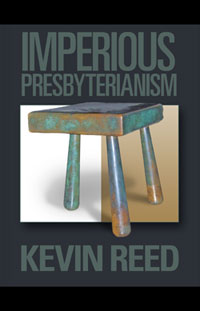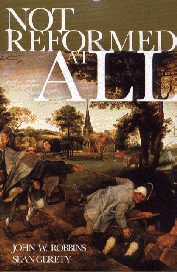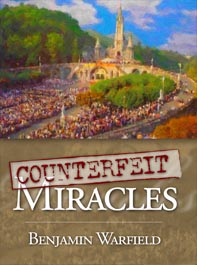 Luther rightly maintained that justification by faith alone is the linchpin upon which the church stands or falls. If this doctrine is lost or even muddied, the semblance of religion remains, but the church fades into nonexistence. That is why a clear and unambiguous definition of faith is essential. If you don’t know exactly what the alone instrument in justification consists of how can it be defended? Further, and in order to avoid equivocation, any definition faith has to apply to all forms of faith whether saving or not. Seems simple, right? The problem is that in the minds of the vast majority of pastors and teachers any time the word “saving” precedes the word “faith” it’s the latter that takes on an entirely new meaning. To that end the traditional threefold definition of faith has been shown to be ambiguous at best and outright dangerous at worst providing an open doorway for pernicious and deadly heresies that snake their way into the Church unabated.
Luther rightly maintained that justification by faith alone is the linchpin upon which the church stands or falls. If this doctrine is lost or even muddied, the semblance of religion remains, but the church fades into nonexistence. That is why a clear and unambiguous definition of faith is essential. If you don’t know exactly what the alone instrument in justification consists of how can it be defended? Further, and in order to avoid equivocation, any definition faith has to apply to all forms of faith whether saving or not. Seems simple, right? The problem is that in the minds of the vast majority of pastors and teachers any time the word “saving” precedes the word “faith” it’s the latter that takes on an entirely new meaning. To that end the traditional threefold definition of faith has been shown to be ambiguous at best and outright dangerous at worst providing an open doorway for pernicious and deadly heresies that snake their way into the Church unabated.
While a source of irritation to many modern Reformed pastors, it was Gordon Clark who first identified this gaping crack in the Church’s foundation and correctly argued that the difference between faith and saving faith are the propositions believed. In contrast, a majority of Reformed pastors and churchmen, who are blindly wed to tradition seemingly for tradition’s sake, maintain that the difference lies not in the propositions believed at all, but in some nebulous psychological state that when mixed with simple faith makes ordinary faith saving.
Like the secret recipe for KFC or McDonald’s special sauce, today’s Reformed leaders and apologists differ wildly when it comes to explaining what exactly in addition to simple faith in the Gospel is needed to save a sinner. PCA pastor Andy Webb says the secret ingredient is a Harry Potter potion mingling “the emotion of love with trust, inclination, and agreement.” The self-proclaimed “Reformed Apologist,” Ron DiGiacomo, claims the magic happens when “a disposition of commitment,” whatever that might entail, is added to simple belief. Alan Strange, who is an OPC minister and professor of church history at Mid-America Reformed Seminary, says the alchemy that makes simple belief alone in Christ alone saving is a “mystery.” Strange warns that any attempt to define what it is that makes ordinary belief saving is like peering into the doctrine of Christ’s Incarnation and is “not amenable to rationalistic reduction.” For Strange what makes ordinary belief saving is beyond human understanding or definition. According to Strange even the words faith and belief differ, despite being translations of the exact same Greek word in Scripture, and that “justifying faith is something more than merely belief: not something less, but something more.” The central error in all this is that faith is belief. Nothing more, nothing less. Consequently, and when you come right down to it, none of these men really believe in justification by faith alone. They just pay it lip service. No wonder the FV continues to spread unabated and the PCA is now a safe haven for the FV. Such is the state of the Reformed and Presbyterian church today.
So, Sean, are you saying that the vast majority of Reformed churchmen don’t believe in justification by faith alone? Well, yes and no. Yes, because they add to saving faith that which is absent from faith simpliciter and end up equivocating, even contradicting themselves, when explaining what exactly the alone instrument of justification is. No, because while confused and mired in meaningless religious jargon, metaphors and word pictures, they don’t add works as that which completes faith making it somehow “saving.” They at least attempt to draw a distinction between God’s once and for all declaration of righteousness the moment a person first believes with works done as the result of this faith in sanctification. They differ, albeit ever so slightly, with the FV men who profess “the faith which is the sole instrument of justification can be understood as … a living, active, and personally loyal faith” (admittedly very similar to DiGiacomo’s “disposition of commitment”).
Concerning this idea of “a living, active, and personally loyal faith,” perhaps the best example demonstrating the inability of the defenders of the traditional threefold definition of faith to safeguard against the deadly errors of heretics like those in the Federal Vision (but you can think of the ever encroaching tentacles of Romanism as well), came during the final days of year long debate between Lane Keister and Federal Vision bigmouth, Doug Wilson. At that point the discussion turned to the nature of saving faith and the questions concerning the “aliveness” of faith in justification. Keister wrote:
Contrary to the criticisms of FV proponents … I know of NO Reformed scholar who says that we are justified by a dead faith. I know of no Reformed scholar who even hints at this. I know of dozens of Reformed scholars who say the aliveness of faith is not what justifies us. The best way I can put this is to say that the aliveness of faith is a sine qua non, but is not part of the inherent structure of justification. Of course the person who stretches out his arm to catch a ball has to be alive to do that. But his being alive is not an action inherent in stretching out his arm. Maybe I can put it this way: states of being are distinct from actions, just like verbs of being are distinct from verbs of action. We must distinguish then between the state of being alive and the verb of action of what faith does in laying hold of Christ’s righteousness. To put it another way, our aliveness can have no object. It is inherently reflexive. But faith’s action in justification takes a direct object: the righteousness of Christ. I really think this is as clear as I can be. I don’t see any reason why Doug should disagree with this, either. I suppose I will have to enact a qualification of this, nevertheless, lest people think I am making faith active. When I am referring to “faith’s action” I do not mean that we are doing a work. I mean only that faith is doing something in justification. And this is what it is doing: it is “accepting, receiving, and resting upon Christ alone for justification” (WCF 14.2). https://greenbaggins.wordpress.com/2009/02/06/one-last-word/
Before unpacking this tragically confused paragraph, the central thing to recognize is that both Keister and Wilson are operating from the exact same definition of saving faith. Both believe that faith can be either “alive” or “dead,” which means, when stripped of its metaphorical trappings, that a person can believe the truth of the Gospel, assent to it, yet still be lost. In order to be saved and for faith to be effectual, something in addition to belief is needed. I can’t tell you how many times over the years I’ve had Reformed pastors tell me that simply believing the Gospel and Christ’s finished work on the cross on account of sin is not enough to save anyone. So much for the idea that the Gospel is “the power of God unto salvation.” But, then, almost in the same breath, they identify Christians as “believers” blissfully unaware of the contradiction right under their nose. This is also why Reformed Christians who refuse to accept contradictions or so-called “paradoxes” in Scripture are routinely attacked and routinely banned from blogs and discussion groups by men for maintaining that sinners are justified by belief alone.
Keister begins by saying that he knows of “NO Reformed scholar who says that we are justified by a dead faith.” But, then he says the aliveness of faith is “not part of the inherent structure of justification.” So, which is it? If we are not justified by dead faith, wouldn’t it follow that we’re saved by a faith that is “alive” whatever that might mean? He then adds this “aliveness” is a “sine qua non,” that which is indispensable or essential to something, just not to justification. Again, how can that be? If faith is the alone instrument in justification than it would seem it is very much “inherent to the structure of justification.” If it’s not, by what means can a sinner be justified?
The tragedy is that Keister is far from alone and his confusion is endemic to virtually all Reformed pastors today who cannot clearly define the difference between faith and saving faith without equivocating or just speaking nonsense. This is why they identify faith as something that can be either “alive” or “dead.” In fact, Keister takes a pointed jab at the late John Robbins writing:
…Robbins and his crowd seem to me to be in danger of denying that justifying faith is alive, which is what the confession says. Now, they may say that assent is alive.
First, as one who identifies with “Robbins and his crowd” I do deny that saving faith is “alive” simply because it is a metaphor that is misapplied to saving faith. Besides, in order for any metaphor to make sense it has to be first explained in literal language. Now, it could be said that saving faith is evidence that a person has already been translated from death to life in regeneration, but beyond that it is a completely irrelevant to the question of the role faith plays in justification. This is an important point because as Dewey Robert’s observers, Federal Visionists like Wilson deny God’s grace in regeneration (see “The Federal Vision and Grace“). Second, the Westminster Confession nowhere says that “justifying faith is alive.” Concerning faith in justification the Confession states; “Faith, thus receiving and resting on Christ and His righteousness, is the alone instrument of justification: yet is it not alone in the person justified, but is ever accompanied with all other saving graces, and is no dead faith, but works by love.” Keister is mistaken simply because that which accompanies something, in this case saving faith, is not part of the essence of saving faith, but rather results from it. That should have been obvious to Keister and the clue is the phrase “works by love,” but more on that later.

 As someone who has shed considerable spiritual blood defending and advocating for Gordon Clark’s simple and biblical definition of faith as an assent to an understood proposition (for example see
As someone who has shed considerable spiritual blood defending and advocating for Gordon Clark’s simple and biblical definition of faith as an assent to an understood proposition (for example see 

































Recent Comments